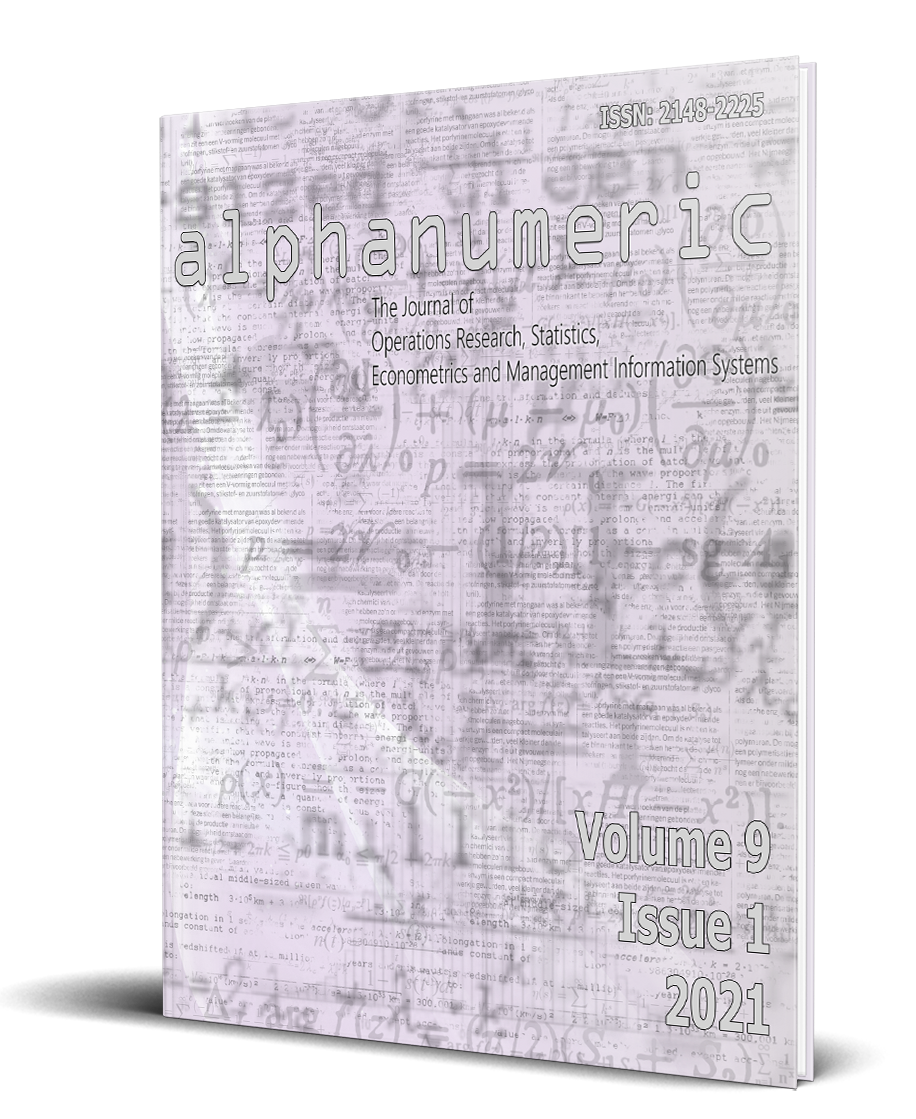
alphanumeric journal
The Journal of Operations Research, Statistics, Econometrics and Management Information Systems
Pharmacy Duty Scheduling Problem: Gumushane Case
Abstract
In the Turkish Healthcare System, pharmacies are an important echelon of the drug supply chain. The pharmacy on duty practice ensures that the demand for drugs and similar medical supplies is met 24/7. The duty pharmacy scheduling problem aims to satisfy the customers and the pharmacists without violating the regulations while determining the duty sequence of the pharmacies in a certain planning period. This study handles the duty pharmacy scheduling problem of Gümüşhane City Center where 13 pharmacies operate. In the current system, the representative pharmacist prepares the duty schedule manually. The planning period is divided into subsets, and pharmacies are assigned to the duties in each subset respectively in such the number of duties of each pharmacy in the subsets is as equal as possible. The managerial problem of the case is that the duty frequency of each pharmacy is variable in the manual schedule and pharmacists perceive this as an unfairness. Because pharmacists expect to be on duty 1 in 13 days. We propose a mathematical model that adopts the fixed duty frequency and the inheritance of duty distribution. We test the model according to the 2020 calendar and compare model results with the real duty schedule belong to 2020 using the 2019 distribution of pharmacies. The comparison and test results show that the duties are distributed as fairly as possible and the turn of each pharmacy is repeated once every 13 days. The contribution of this study is that it introduces innovative components to the pharmacy duty scheduling problem, offers practical policy recommendations, and provides a case-specific example to limited PDS literature.
Keywords: Integer Programming, Pharmacy Duty Scheduling, The Fixed Duty Frequency, The Inheritance of Duty Distribution
Jel Classification: C01
Suggested citation
(). Pharmacy Duty Scheduling Problem: Gumushane Case. Alphanumeric Journal, 9(1), 85-98. http://dx.doi.org/10.17093/alphanumeric.819804
References
- Abo-Hamad, W., & Arisha, A. (2013, 1 1). Simulation-based framework to improve patient experience in an emergency department. European Journal of Operational Research, 224(1), 154-166.
- Adan, I., Bekkers, J., Dellaert, N., Vissers, J., & Yu, X. (2009, 6 4). Patient mix optimisation and stochastic resource requirements: A case study in cardiothoracic surgery planning. Health Care Management Science, 12(2), 129-141.
- Brunner, J., Bard, J., & Kolisch, R. (2009, 7). Flexible shift scheduling of physicians. Health Care Management Science, 12(3), 285-305.
- Ceyhan, G., & Özpeynirci, Ö. (2016, 8 1). A branch and price algorithm for the pharmacy duty scheduling problem. Computers and Operations Research, 72, 175-182.
- Dursun, M., Karsak, E., & Karadayi, M. (2011, 9 1). A fuzzy multi-criteria group decision making framework for evaluating health-care waste disposal alternatives. Expert Systems with Applications, 38(9), 11453-11462.
- Jiang, L., & Giachetti, R. (2008, 9). A queueing network model to analyze the impact of parallelization of care on patient cycle time. Health Care Management Science, 11(3), 248-261.
- Kahraman, C., & Topcu, Y. (Dü). (2018). Operations Research Applications in Health Care Management (Cilt 262). Cham: Springer International Publishing.
- Kanuganti, S., Sarkar, A., Singh, A., & Arkatkar, S. (2015, 9 1). Quantification of accessibility to health facilities in rural areas. Case Studies on Transport Policy, 3(3), 311-320.
- Kocatürk, F., & Özpeynirci, Ö. (2014, 11 1). Variable neighborhood search for the pharmacy duty scheduling problem. Computers and Operations Research, 51, 218-226.
- Özgür, A., Nar, F., Esen, D., Özkan, F., & Uygun, E. (2009). Stochastic Optimization of Turn of Duty for Pharmacies. International Symposium on Health Informatics and Bioinformatics (HIBIT).
- Özpeynirci, Ö., & Ağlamaz, E. (2016, 5 1). Pharmacy duty scheduling problem. International Transactions in Operational Research, 23(3), 459-480.
- Swisher, J., Jacobson, S., Jun, J., & Balci, O. (2001). Modeling and analyzing a physician clinic environment using discrete-event (visual) simulation. Computers & Operations Research, 28(2), 105-125.
- Tüzün, S., & Topcu, Y. (2018). A taxonomy of operations research studies in healthcare management. S. Tüzün, & Y. Topcu içinde, International Series in Operations Research and Management Science (Cilt 262, s. 3-21). Springer New York LLC.
- Uncu, N., Bulğurcu, B., & Kılıç, F. (2018, 6 1). Distance restricted maximal covering model for pharmacy duty scheduling problem. International Journal of Optimization and Control: Theories and Applications, 8(2), 208-215.
- Varela, P., de Martins, G., & Fávero, L. (2010, 6 21). Production efficiency and financing of public health: An analysis of small municipalities in the state of São Paulo- Brazil. Health Care Management Science, 13(2), 112-123.
2021.09.01.OR.03
alphanumeric journal
Pages 85-98
Received: Nov. 2, 2020
Accepted: May 31, 2021
Published: June 30, 2021
2021 Şimşek, AB., Merdane, S., Belindir, A., Akbaş, A.
This is an Open Access article, licensed under Creative Commons Attribution-NonCommercial 4.0 International License.

scan QR code to access this article from your mobile device
Contact Us
Faculty of Transportation and Logistics, Istanbul University
Beyazit
Campus 34452 Fatih/Istanbul/Türkiye
Bahadır Fatih Yıldırım, Ph.D.
editor@alphanumericjournal.com
+ 90
(212) 440 00 00 - 13219
alphanumeric journal
alphanumeric journal has been publishing as "International Peer-Reviewed Journal" every six months since 2013. alphanumeric serves as a vehicle for researchers and practitioners in the field of quantitative methods, and is enabling a process of sharing in all fields related to the operations research, statistics, econometrics and management informations systems in order to enhance the quality on a globe scale.

